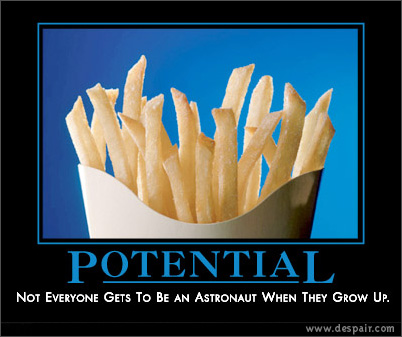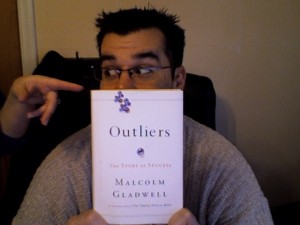During the holidays my father-in-law was telling me about a book he had recently read. It was “Outliers: The Story of Success.” I was intrigued by my father-in-law recounting the stories about how all hockey players are born in January, towns in Pennsylvania that have no heart disease, and why Asians are so good a math. I ordered the book
and dove in hoping to be amazed at the facts and details about to be presented. The term ‘outliers’ itself had me giddy with excitement; I was thinking the book would have lots of statistical references for me to peruse and review. Alas, it was not to be, as the book lacked any relevant statistics.
So I was quite disappointed. I had the impression that the author would be trying to find some incredible explanation for the success of a group of people he classified as outliers. By the way, the definition of an outlier is that you have a deviation from your sample population. But the author decides on who makes up the populations he discusses, which then allows for him to push forward with his opinions as if they were facts.
What I got from the book regarding success was this: be born at the right time and have a family lineage that lends itself to hard work. Oh, and then work hard for 10,000 hours on a passion of yours, and then you can cash in on your success by taking advantage of your skills as you seize upon the right opportunity (at the right time). Is any of that information news to anyone? Did anyone really believe that success is mostly just dumb luck, and that people such as Bill Gates did not sacrifice a lot of time and energy into becoming a success? I think the book would have been better had the author not gone out his way to talk about how your lineage is so important. Lot’s of people work hard and are successful without ever having set foot in a rice paddy, or hauled stones on their backs for miles.
I wasn’t going to blog about this book but the comments about Asians and math really struck a nerve. And that’s when I started to go back and reread sections of the book to realize that there were few facts being presented. It was mostly opinions based upon carefully selected evidence. For example, here are some of the assertions he made:
- “…Asian children learn to count much faster than American children. Four-year-old Chinese children can count, on average, to forty. American children at that age can count only to fifteen, and most don’t reach forty until they’re five. By the age of five, in other words, American children are already a year behind their Asian counterparts in the most fundamental of math skills.“
- Coming from a culture shaped by the demands of growing rice also makes you better at math.
Why did these ruffle my feathers so much? Probably because my children were able to count to 100 when they were four years old. They could also count aloud to ten in Spanish and French. And they have no idea about how to grow rice, and neither do I or anyone else native to New England. So, either the authors assertions are not entirely correct, or myself and my family should be included as an “outlier”. Or we are really Asian.
The other part that bothers me is how he chose the words with which to make his point. Asian children (not Chinese, not Korean, not Japanese…but all Asians) can count “on average” to forty. OK, fine. But the next sentence switches contexts. We go from something “on average” to “American children at that age can only count to fifteen”. Not that the “average” American child would be only counting to fifteen. No, he carefully puts into your mind that all American children are only able to count to fifteen. Well, except for mine, but that would disprove his theory so I doubt he will be interviewing my family anytime soon. But we could be Asian. And the last quoted sentence also puts forward a “fact” that all American students are already a year behind Asian students. Sorry, but I’m a stickler for things like “all” and “every”. If you are going to use them, you had better be able to prove yourself. If I find one counterexample then I am going to ask you reword your assertions.
I decided to check with a friend of mine about this topic. Being a Korean-American who happens to not excel in mathematics I thought he could offer a interesting perspective. His take?
“I was born here in the US. It’s not really language I think, but more cultural mindset. In Korea, it’s a very different story and competition is what drives them to push themselves. They have to work harder over there because the country structure is based on dynasties that aren’t ashamed of nepotism and ensuring genealogical Darwinism remains intact.
As for growing up here with immigrant parents, I grew up being told that I would be at a disadvantage for things I couldn’t control, e.g. ethnicity. What’s great here in the US is that it’s a somewhat more level playing field, globally speaking. That’s how the architects of this country designed it. You’ll notice that a lot of our tax laws were designed to minimize the creation of legacies and dynasties by making it very difficult to pass on wealth from one generation to the next. There’s a lot of thought put into things here. So, here the idea is that if you work hard, you can negate the effects of those disadvantages.
If you want to be an outlier, you need to quickly come to terms that not everyone is equal and exploit what you’re good at. For the things that come easily to you, your efforts are magnified. If you focus on developing that you’ll have a natural advantage and then your hard work pays off more than the other guy. What the author fails to recognize is that life isn’t fair and that equality is a myth. Everyone is born with natural advantages and disadvantages stemming from timing, geography, economics, heritage and genes. Sometimes fortune smiles and changes the whole game for no other reason than luck. So, rather than waste your time trying to be all well rounded, exploit your advantages and your weaknesses won’t really matter as much. I suck at math, so I don’t bother. I suck at medicine, so I’m not a doctor. If you suck at everything, then well…”
So, nepotism could play a factor here? I wonder why the author didn’t mention that possibility? He did, however, mention that his studies are incomplete. For example, there is a large part of the Chinese population that are not included in his results. They live to the north and are not working in rice paddies (rather convenient to leave them out, eh?) And there are other Asian populations not included, although you wouldn’t know it from his frequent use of the term; you start to think he has actually done some extensive research only to find that he has had a very narrow focus all along.
And don’t get me started on the hockey players. I could go on for days about all the stuff the author conveniently left out of the book regrding that discussion. (OK, here is one: what about the thousands of kids born in January that play hockey but don’t get promoted to the better teams? Care to discuss the difference between them and the ones that do get promoted? No, of course not, because then you would have to do more research than looking at a calendar.)
It’s still a good read, I enjoyed a lot of the stories, but I won’t add it to my library at this point.



I’ve actually heard that the perception that Asians are “good at math” is really a US myth that comes from the fact that only the TOP engineering students from China/Japan/etc get the opportunity to attend US colleges. Not exactly a representative sample. Can’t remember where I saw that discussed…
I agree with ALL of your assertions in the review. EVERY point you make is well-presented.
I read the book too – the 10,000 hours thing stood out in my mind as “hmmm… really?” – it seemed to me at least like the author was suggesting that’s all it took. Put in the time and magic happens to make the opportunities appear.
You make the point though that there is more involved than that. Sure, I get it that mastery may be possible, perhaps even LIKELY, but certainly not GUARANTEED in that timeframe. I can almost promise you that even given 50,000 hours, I won’t be a great violinist, for example.
Fun read, but almost as much for the mental arguments with the book as for the content presented. When I was reading it, I almost got to the point where I wondered if that was the point of the book…?
Great review!
I loved this review. In fact, I enjoyed it so much that I used it as a reference for a report in school. I gave credit, don’t worry. Also, I’m a 12 year old seventh grader whose teacher is a lunatic and told us we should be able to understand all of it and not be bored with the novel.